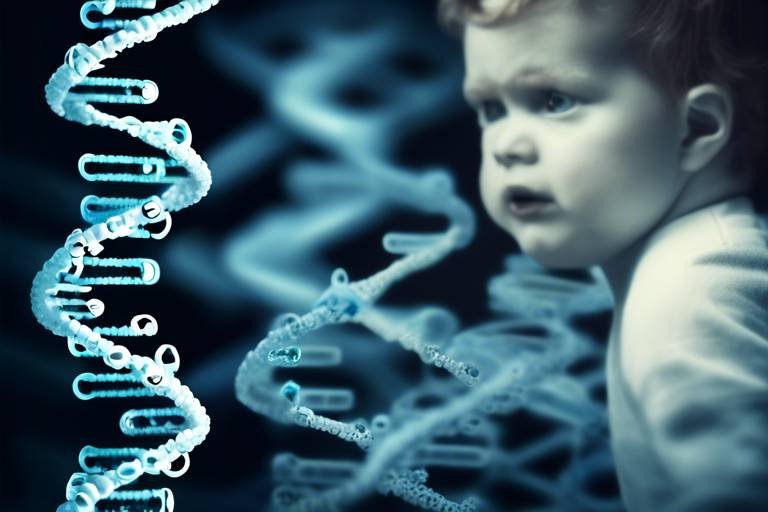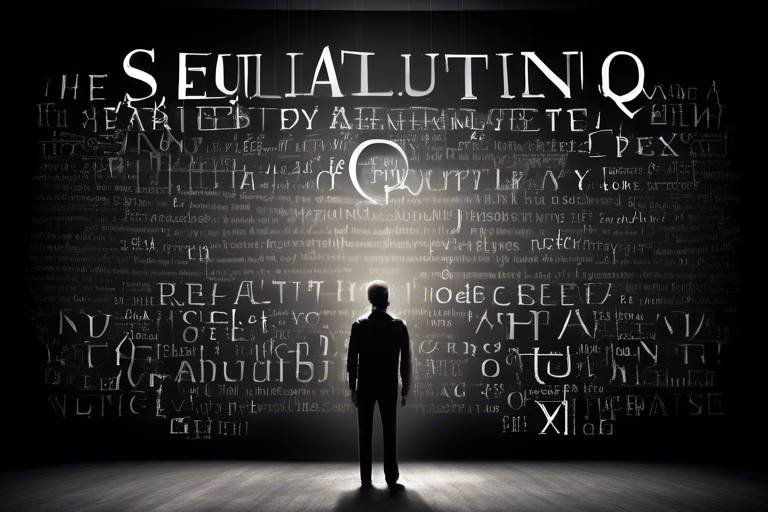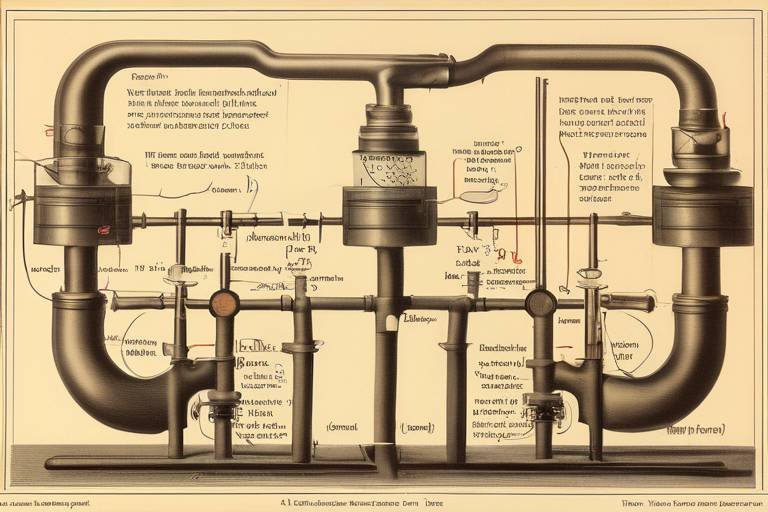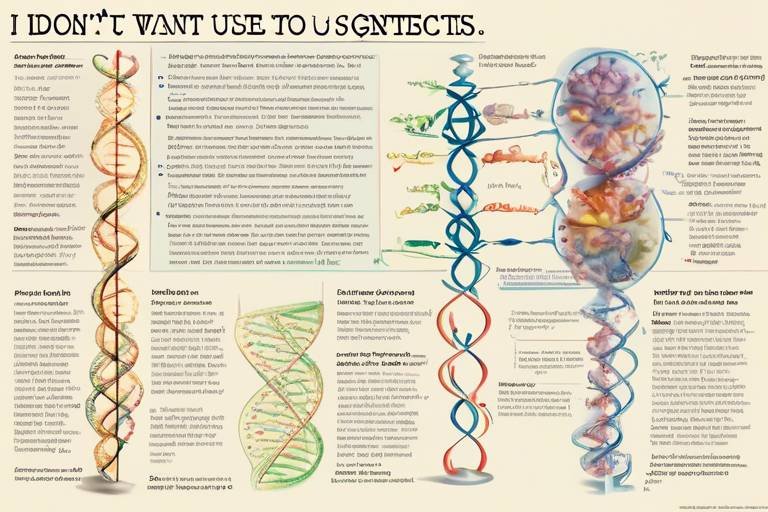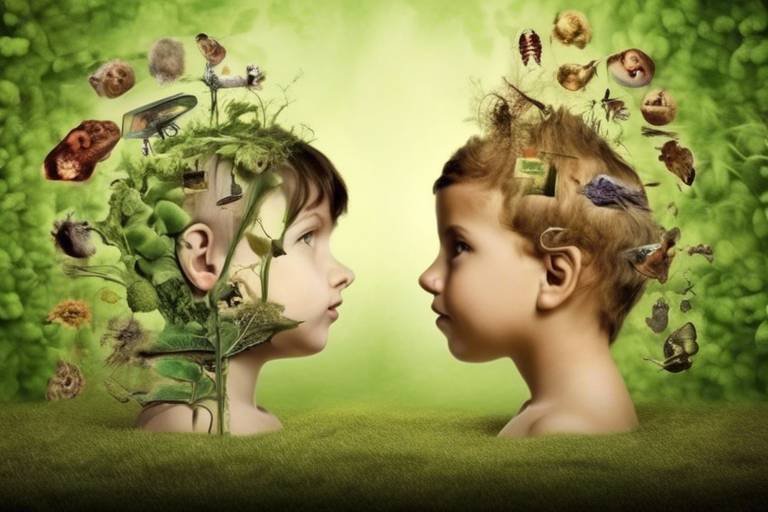The Discourse between Causality and Free Will in Science
This article explores the intricate relationship between causality and free will, examining how these concepts interact within scientific frameworks and philosophical debates. The exploration of causality and free will is not just an academic exercise; it resonates deeply with our everyday experiences and decision-making processes. Imagine standing at a crossroads, pondering which path to take. Is your choice a product of your free will, or is it determined by a series of prior events and conditions? This question lies at the heart of a debate that has spanned centuries, engaging philosophers, scientists, and thinkers alike.
Causality is a fundamental principle in science, dictating how events are linked. At its core, causality refers to the relationship between causes and effects, where one event (the cause) leads to another event (the effect). This principle is not just a dry concept confined to textbooks; it has profound implications in various scientific disciplines, from physics to biology. For instance, in the realm of physics, understanding causality allows scientists to predict the motion of objects and the behavior of particles. Without this foundational concept, our grasp of the universe would be severely limited. But why is causality so significant? It provides a framework for understanding the world around us, allowing us to make sense of complex systems and phenomena.
Free will refers to the ability of individuals to make choices unconstrained by external factors. It is a concept that sparks intense debate in philosophical circles and beyond. What does it mean to have free will? Is it an illusion, or is it a genuine aspect of human existence? The philosophical underpinnings of free will delve into the nature of choice and responsibility. For example, if our decisions are influenced by our genetics or environment, can we truly claim to be free? This question becomes even more pressing when we consider the implications of free will in the context of human behavior and decision-making. The ability to choose is often linked to moral responsibility; if we are not free to make our choices, can we be held accountable for our actions?
Physics heavily relies on causal relationships to explain natural phenomena. In classical physics, the universe operates on deterministic principles, where every effect has a specific cause. This deterministic view of the universe paints a picture of a well-ordered machine, where every action can be traced back to a preceding event. However, as we delve into quantum physics, the narrative shifts dramatically. Quantum mechanics introduces concepts like probability and uncertainty, challenging our traditional understanding of causality. Here, particles can exist in multiple states simultaneously until observed, leading to fascinating implications for how we understand causality at the microscopic level. This shift begs the question: if causality can be uncertain, what does that mean for our understanding of free will?
Classical mechanics operates on deterministic principles, where every effect has a specific cause. This framework influences our understanding of motion and interactions, providing a clear cause-and-effect relationship that seems almost intuitive. For instance, if you throw a ball, its trajectory can be predicted based on the force applied, the angle of release, and other factors. This predictability fosters a sense of control and understanding over our physical environment. However, this deterministic view also raises questions about the nature of human actions. If our choices can be traced back to prior causes, can we still consider ourselves free agents in a deterministic universe?
Quantum mechanics challenges traditional views of causality, introducing concepts like probability and uncertainty. In the quantum realm, particles do not follow a deterministic path; instead, they exist in a state of probability until measured. This introduces a fascinating twist to our understanding of causality: events at the quantum level may not have clear causes in the way we expect. This uncertainty can be likened to a game of chance, where the outcome is not predetermined. As we grapple with these ideas, we must ask ourselves: if our understanding of causality is fundamentally altered at the quantum level, how does this impact the concept of free will? Are our decisions influenced by underlying quantum processes that we cannot control?
Psychology investigates the notion of free will through behavior and cognition. The field explores how psychological theories interpret free will and its implications for personal responsibility. For instance, some psychologists argue that our choices are heavily influenced by subconscious processes, past experiences, and biological factors. This perspective raises critical questions about the authenticity of our decisions. If our choices are shaped by factors beyond our awareness, can we truly claim to exercise free will? This inquiry is not merely academic; it has real-world consequences, particularly in areas like criminal justice and mental health, where understanding the roots of behavior can inform approaches to rehabilitation and accountability.
The relationship between causality and free will is complex and often contentious. These two concepts can coexist in a delicate balance, but they can also conflict, leading to philosophical dilemmas. For instance, determinism—the idea that all events are determined by prior causes—challenges the notion of free will. If every action has a cause, can we genuinely claim to have the freedom to choose? Conversely, proponents of free will argue that humans are capable of making independent choices, even in the face of external influences. This ongoing dialogue invites us to reflect on our understanding of agency and responsibility.
Philosophers have long debated the compatibility of causality and free will. Various philosophical stances have emerged, including:
- Determinism: The belief that all events, including human actions, are determined by preceding causes.
- Libertarianism: The view that free will is incompatible with determinism, advocating that individuals can make genuinely free choices.
- Compatibilism: The position that free will and determinism can coexist, suggesting that individuals can act freely within a deterministic framework.
These perspectives illustrate the rich tapestry of thought surrounding the discourse between causality and free will, inviting us to ponder our own beliefs about choice and agency.
The dialogue between causality and free will has profound implications for science. As scientific discoveries continue to reshape our understanding of the universe and human behavior, we are forced to reconsider what it means to be an autonomous agent. For instance, advancements in neuroscience have revealed how brain processes influence decision-making, challenging traditional notions of free will. Moreover, as we explore the complexities of human behavior through the lens of psychological research, we must acknowledge that our understanding of agency is continually evolving. This intersection of science and philosophy not only enriches our understanding of human nature but also has far-reaching consequences for ethics, law, and society.
What is causality? Causality refers to the relationship between causes and effects, where one event leads to another. It is a fundamental principle in science that helps us understand how events are linked.
Can free will exist in a deterministic universe? This is a contentious debate among philosophers. Some argue that free will can coexist with determinism (compatibilism), while others believe that true free will is incompatible with a deterministic framework.
How does quantum mechanics affect our understanding of causality? Quantum mechanics introduces concepts like probability and uncertainty, challenging traditional deterministic views of causality and suggesting that events at the quantum level may not have clear causes.
What role does psychology play in the debate over free will? Psychology examines how behavior and cognition influence our sense of free will, exploring the extent to which our choices are shaped by subconscious processes and external factors.

The Concept of Causality
Causality is one of those concepts that sits at the heart of scientific inquiry, acting as the backbone of our understanding of the universe. In simple terms, causality refers to the relationship between causes and effects. It’s the reason we believe that if we drop a ball, it will fall to the ground. But have you ever stopped to think about how this principle extends beyond mere physical phenomena? Causality isn't just a rule for physicists; it shapes our entire worldview, influencing everything from our daily decisions to our understanding of complex systems.
In science, causality is significant because it provides a framework for establishing predictability. When we understand that one event leads to another, we can formulate theories, conduct experiments, and ultimately make predictions about future occurrences. For instance, in biology, knowing that a virus can cause an illness allows researchers to develop vaccines and treatments. In this way, causality is not just an abstract concept; it has real-world implications that can save lives and improve our quality of life.
However, causality is not without its complexities. Take a moment to consider the idea of correlation versus causation. Just because two events occur together does not mean one causes the other. For example, ice cream sales may rise in the summer, and so do instances of sunburn. Does this mean that eating ice cream causes sunburn? Of course not! This is where the nuances of causality come into play, and understanding these distinctions is crucial for scientific accuracy.
To illustrate the importance of causality, let’s look at a few scientific disciplines where it plays a pivotal role:
- Physics: In physics, causality is foundational. The laws of motion and thermodynamics rely on cause-and-effect relationships to explain how objects interact.
- Biology: In biology, understanding the causative agents of diseases has led to breakthroughs in treatment and prevention.
- Social Sciences: In fields like psychology and economics, causality helps researchers understand how behaviors and decisions are influenced by various factors.
Ultimately, the concept of causality is more than just a scientific principle; it is a lens through which we can view the world. It invites us to ask questions and seek answers, pushing the boundaries of our understanding. As we delve deeper into the realms of science and philosophy, the exploration of causality not only enriches our knowledge but also challenges us to think critically about our existence and the forces that shape our reality.

Free will is a concept that has intrigued humanity for centuries, raising questions about the very nature of our existence and decision-making. At its core, free will refers to the ability of individuals to make choices that are not constrained by external forces. Imagine standing at a crossroads, where each path represents a different choice; the freedom to select a direction is what we often associate with free will. But what does it truly mean to have this freedom, and how does it fit into the larger tapestry of human behavior and decision-making?
To understand free will, we need to delve into its philosophical roots. Philosophers have long debated its implications, often contrasting it with determinism—the idea that every event, including human actions, is determined by preceding events in accordance with the natural laws. This raises a compelling question: if our choices are predetermined, can we truly be said to have free will? This philosophical tug-of-war is not merely academic; it has real-world implications for how we view morality, accountability, and personal responsibility.
In psychology, free will is examined through the lens of behavior and cognition. Psychologists study how our thoughts, emotions, and social contexts influence our choices. For instance, consider the following factors that can impact decision-making:
- Environmental Influences: Our surroundings can shape our choices significantly. From social pressures to cultural norms, the environment plays a crucial role.
- Biological Factors: Genetics and brain chemistry can influence our impulses and preferences, often leading to questions about the extent of our free will.
- Conscious vs. Subconscious Decisions: Much of our decision-making occurs below the level of conscious awareness, raising questions about how free our choices really are.
The interplay between these factors complicates the notion of free will. For instance, if a person makes a choice influenced heavily by their environment or biology, can we still say they acted freely? This leads us to consider the implications of free will in the context of moral responsibility. If our actions are influenced by factors beyond our control, should we still be held accountable for them?
As we explore the concept of free will, it becomes evident that it is not merely a binary choice between being free or not. Instead, it exists on a spectrum, where individuals navigate their choices amidst various constraints. This nuanced understanding allows for a richer dialogue about what it means to be human and how we can reconcile the desire for freedom with the realities of our interconnected world.
In summary, defining free will is both a philosophical and psychological endeavor. It challenges us to consider not just the choices we make, but the very nature of those choices. As we continue to explore this concept, we must remain open to the complexities and contradictions that make human decision-making such a fascinating subject.
- What is free will? Free will is the ability to make choices that are not constrained by external factors.
- How does free will relate to determinism? Determinism suggests that all events, including human actions, are determined by preceding events, raising questions about the existence of free will.
- Can free will coexist with psychological influences? Yes, free will can coexist with psychological influences, but it complicates the understanding of personal responsibility.

Causality is not just a buzzword in the realm of science; it’s the backbone of how we understand the universe. In physics, causality refers to the relationship between cause and effect, where one event (the cause) leads to another event (the effect). This principle is paramount, as it helps scientists predict outcomes based on known conditions. Imagine throwing a stone into a pond; the stone creates ripples that expand outward. Here, the stone's throw is the cause, and the ripples are the effect. This simple example encapsulates the essence of causality.
In classical physics, causality is often viewed through a deterministic lens. This means that if we know the initial conditions of a system, we can predict future states with absolute certainty. Think of it like a well-oiled machine: every gear has its place and function, and if everything is set correctly, the outcome is predictable. For instance, Newton's laws of motion exemplify this deterministic view. If you know the forces acting on an object and its initial velocity, you can calculate its future trajectory precisely.
However, the world of physics becomes much more intriguing when we dive into quantum mechanics. Here, causality takes on a different flavor. Unlike classical mechanics, quantum mechanics introduces elements of probability and uncertainty. Events at the quantum level do not follow the same deterministic rules; instead, they are governed by probabilities. A famous thought experiment, Schrödinger's cat, illustrates this beautifully. In this scenario, a cat is both alive and dead until observed, challenging our traditional understanding of causality. It raises the question: does the act of observation create the outcome, or is it merely revealing what already exists? This paradox highlights how quantum mechanics can blur the lines of cause and effect.
To further illustrate the differences in causality between classical and quantum physics, consider the following table:
| Aspect | Classical Physics | Quantum Physics |
|---|---|---|
| Causality | Deterministic | Probabilistic |
| Example | Newton's Laws | Schrödinger's Cat |
| Predictability | High | Low |
This contrast between classical and quantum mechanics showcases the evolving understanding of causality in physics. While classical mechanics provides a solid foundation for predicting the behavior of macroscopic objects, quantum mechanics invites us to reconsider our definitions and assumptions about cause and effect. It challenges us to think about the universe in a more nuanced way, where certainty gives way to possibility.
As we continue to explore the cosmos, the relationship between causality and free will becomes increasingly complex. The implications of these scientific principles stretch beyond physics, influencing fields like philosophy and psychology. Understanding causality in physics not only enhances our grasp of the natural world but also prompts profound questions about our place within it. Are our choices predetermined by the laws of physics, or do we possess the freedom to shape our destinies? This dialogue between causality and free will is a fascinating journey that invites us to ponder the very nature of existence.
- What is causality in physics? Causality in physics refers to the relationship between cause and effect, where one event leads to another.
- How does classical physics view causality? Classical physics operates on deterministic principles, meaning that if the initial conditions are known, future states can be predicted with certainty.
- What is the role of probability in quantum mechanics? In quantum mechanics, causality becomes probabilistic, meaning outcomes cannot be predicted with absolute certainty.
- How do classical and quantum mechanics differ in their treatment of causality? Classical mechanics is deterministic, while quantum mechanics introduces uncertainty and probability, challenging traditional notions of cause and effect.

Classical mechanics is the branch of physics that deals with the motion of objects and the forces acting upon them. At its core, it is governed by deterministic principles, which means that every effect has a specific cause. This deterministic nature of classical mechanics provides a framework that allows us to predict the future state of a system based on its current conditions. For instance, if you know the position, velocity, and acceleration of a ball, you can calculate exactly where it will be at any given moment in the future. This predictability is what makes classical mechanics so powerful and widely applicable in engineering, astronomy, and everyday life.
One of the fundamental laws that illustrate this principle is Newton's Second Law of Motion, which states that the force acting on an object is equal to the mass of that object multiplied by its acceleration (Fma). This equation encapsulates the essence of causality in classical mechanics: a specific force will produce a predictable change in the motion of an object. This relationship is not just theoretical; it forms the basis for countless practical applications, from launching rockets to designing roller coasters.
However, while classical mechanics provides a clear-cut view of causality, it also raises intriguing questions about the nature of free will. If our actions can be predicted with such precision, do we truly have the freedom to choose our paths? This tension between determinism in classical mechanics and the notion of free will is a topic that continues to spark debates among scientists and philosophers alike. Some argue that if everything is predetermined by the laws of physics, then our sense of agency may be an illusion. Others contend that human consciousness and decision-making introduce complexities that cannot be fully captured by mechanical laws alone.
To further illustrate the relationship between causality and classical mechanics, consider the following table that summarizes key principles:
| Principle | Description | Example |
|---|---|---|
| Determinism | Every effect has a specific cause, leading to predictable outcomes. | Calculating the trajectory of a projectile. |
| Newton's Laws | Describes the relationship between forces and motion. | Using Fma to find acceleration. |
| Conservation Laws | Energy and momentum are conserved in isolated systems. | A bouncing ball retains its energy until friction acts on it. |
In summary, classical mechanics provides a robust framework for understanding causality, where every action has a corresponding reaction. However, the implications of this deterministic view on our understanding of free will remain a topic of rich philosophical inquiry. As we delve deeper into the nuances of motion and forces, we also confront the profound questions about the nature of our choices and the extent of our agency in a universe governed by physical laws.
- What is classical mechanics? Classical mechanics is a branch of physics that deals with the motion of objects and the forces acting upon them.
- How does classical mechanics relate to causality? Classical mechanics operates on deterministic principles, meaning every effect has a specific cause, allowing for predictable outcomes.
- What are some examples of classical mechanics in everyday life? Examples include predicting the trajectory of a thrown ball, designing vehicles, and understanding the motion of planets.
- Does classical mechanics imply that free will is an illusion? This is a debated topic; while classical mechanics suggests determinism, many argue that human consciousness introduces complexities that allow for free will.

When we dive into the realm of quantum mechanics, we enter a world that defies the traditional notions of causality we've grown accustomed to in classical physics. In classical mechanics, the universe operates like a well-oiled machine—every action has a predictable reaction, and every cause leads to a specific effect. However, quantum mechanics throws a wrench into this neat framework, introducing a level of probability and uncertainty that challenges our fundamental understanding of causality.
At the heart of quantum mechanics lies the concept of superposition, where particles can exist in multiple states at once until measured. This leads us to the famous thought experiment known as Schrödinger's cat, where a cat in a sealed box is simultaneously alive and dead until someone opens the box to observe it. This paradox illustrates how the act of observation plays a critical role in determining outcomes, raising questions about whether our choices have a causal effect or if they merely reveal pre-existing probabilities.
Moreover, quantum entanglement further complicates the relationship between causality and free will. When two particles become entangled, the state of one instantly influences the state of the other, regardless of the distance separating them. This phenomenon suggests a level of interconnectedness that seems to bypass the traditional causal chains we rely on in classical physics. Imagine two dancers performing a duet; even when separated by miles, their movements remain synchronized, hinting at a profound connection that transcends physical boundaries.
In light of these quantum principles, scientists and philosophers alike grapple with questions such as:
- Can we truly claim that our actions are free if they are influenced by probabilistic events at the quantum level?
- Does the uncertainty inherent in quantum mechanics imply that causality is not as straightforward as we once believed?
As we explore these questions, it's essential to recognize that quantum mechanics doesn't necessarily negate causality; instead, it invites us to rethink how we understand it. The probabilistic nature of quantum events suggests that while we may not always predict outcomes with certainty, there is still a framework of relationships that govern these events. Thus, the dialogue between causality and free will in the quantum realm remains a vibrant and ongoing discussion, pushing the boundaries of both science and philosophy.
- What is the main difference between classical mechanics and quantum mechanics?
Classical mechanics is deterministic, meaning that every effect has a specific cause. In contrast, quantum mechanics introduces probabilities and uncertainties, where outcomes can exist in multiple states until observed. - How does quantum entanglement challenge our understanding of causality?
Quantum entanglement suggests that particles can be interconnected in ways that defy classical causal relationships, leading to instantaneous influences regardless of distance. - Can free will exist in a quantum universe?
This remains a contentious topic among philosophers and scientists. Some argue that the probabilistic nature of quantum mechanics allows for free will, while others contend that it complicates the notion of agency.

When we dive into the realm of psychology, the concept of free will takes on a fascinating dimension. Psychologists have long been intrigued by how our mental processes, behaviors, and choices are influenced by both internal and external factors. At its core, free will suggests that we have the ability to make choices that are not merely the result of biological or environmental conditioning. But how real is this freedom? Can we genuinely claim to exercise free will, or are our decisions simply the products of a complex web of psychological influences?
To understand this better, we need to consider several key psychological theories that address free will. For instance, behaviorism posits that our actions are largely shaped by our environment. According to this view, our choices are responses to stimuli, and thus, the notion of free will is somewhat an illusion. On the other hand, humanistic psychology argues for the inherent capacity of individuals to make choices and to pursue personal growth, emphasizing autonomy and self-determination.
This dichotomy raises some intriguing questions: Are we merely puppets of our upbringing and societal influences, or do we possess the agency to break free from these constraints? The truth likely lies somewhere in between. Many psychologists advocate for a compatibilist perspective, suggesting that while our choices may be influenced by various factors, we still retain the ability to make conscious decisions. This leads us to the idea of personal responsibility; if we have some level of free will, then we must also accept accountability for our actions.
Moreover, research in cognitive psychology reveals that our decision-making processes are often more complicated than we might think. For example, studies have shown that our subconscious mind plays a significant role in shaping our choices, sometimes even before we are consciously aware of them. This raises the question: how much control do we truly have over our decisions? As we navigate through life, our experiences, emotions, and even our biological predispositions can steer us in certain directions, making the concept of free will both intriguing and perplexing.
In practical terms, understanding free will in psychology can have profound implications for various fields, including mental health and therapy. Therapists often encourage clients to recognize their ability to make choices and to empower them to take control of their lives. This therapeutic approach fosters a sense of agency, helping individuals to realize that while they may face challenges, they still have the power to influence their outcomes.
In conclusion, the exploration of free will within psychology reveals a complex interplay between autonomy and influence. While our choices may be shaped by a multitude of factors, the essence of being human lies in our capacity to reflect, choose, and grow. The journey to understanding free will is ongoing, and it invites us to ponder the very nature of our existence.
- What is free will in psychology? Free will in psychology refers to the ability of individuals to make choices that are not solely determined by external influences or internal conditioning.
- How do psychologists study free will? Psychologists study free will through various theories, experiments, and observations of human behavior, often analyzing the factors that influence decision-making.
- Can free will coexist with determinism? Yes, many psychologists advocate for a compatibilist view, suggesting that while our choices may be influenced by various factors, we still retain some level of autonomy.
- What role does personal responsibility play in free will? If we accept that we have free will, we also accept personal responsibility for our actions, as our choices reflect our values and intentions.

The relationship between causality and free will is a fascinating and often contentious topic that has sparked debates among philosophers, scientists, and the general public alike. At first glance, it may seem that these two concepts are in direct conflict. After all, if every event has a cause, how can we claim to have the freedom to make our own choices? This question invites us to delve deeper into the philosophical and scientific discussions surrounding these ideas, revealing a complex interplay that shapes our understanding of human behavior and agency.
To better understand this intersection, it’s essential to recognize that causality implies a certain level of determinism. In a deterministic framework, every action we take is the result of preceding events and conditions. For instance, if we consider a simple decision like choosing what to eat for dinner, one might argue that this choice is influenced by a variety of factors: our hunger level, past experiences, cultural influences, and even our emotional state at the time. Each of these elements can be traced back to prior causes, suggesting that our decision was predetermined by a chain of events.
On the other hand, the concept of free will posits that individuals possess the capacity to make choices independent of external constraints. This idea is deeply rooted in our sense of identity and moral responsibility. Imagine if every decision you made was merely a response to external stimuli; it would challenge the notion of personal accountability. If we are not truly free to choose, can we be held responsible for our actions? This dilemma raises questions about justice, ethics, and the very fabric of society.
Philosophers have proposed various frameworks to reconcile these conflicting views. For example, determinism argues that every event is causally determined, leaving little room for free will. In contrast, libertarianism asserts that individuals can act freely and that some choices are not predetermined. Then there’s compatibilism, which suggests that free will and determinism can coexist. Compatibilists argue that even if our choices are influenced by prior events, we still have the capacity to act according to our desires and motivations, thus preserving a sense of freedom.
From a scientific perspective, the dialogue between causality and free will has profound implications. For instance, findings in neuroscience suggest that our brains may initiate decisions before we are consciously aware of them, raising questions about the authenticity of our choices. If our brain is acting on a causal basis, how does that fit into our understanding of free will? This inquiry leads to further exploration of human agency, moral accountability, and the nature of consciousness itself.
As we navigate these complex waters, it’s crucial to remember that both causality and free will play vital roles in shaping human experience. While causality provides a framework for understanding the world around us, free will enriches our lives by allowing us to feel empowered in our decisions. The challenge lies in finding a balance between the two—acknowledging the influences of our past while embracing the freedom to shape our futures.
- What is the main conflict between causality and free will?
The primary conflict lies in whether our choices are determined by prior events (causality) or if we can make independent choices (free will). - Can causality and free will coexist?
Yes, some philosophers argue for compatibilism, which suggests that free will can exist within a deterministic framework. - How do scientific discoveries influence our understanding of free will?
Discoveries in neuroscience, for example, challenge traditional notions of free will by indicating that decisions may be initiated subconsciously. - What implications does this debate have for moral responsibility?
If our actions are determined by prior causes, it raises questions about whether we can be held accountable for our choices.

The philosophical discourse surrounding the concepts of causality and free will is as intricate as it is fascinating. Think of it as a grand chess match, where each move represents a theory that challenges or supports the opposing side. At the heart of this debate are three primary perspectives: determinism, libertarianism, and compatibilism. Each of these schools of thought provides a unique lens through which we can examine the interplay between causality and free will.
Determinism posits that every event or action is the result of preceding events in accordance with the laws of nature. In this view, the universe operates like a massive clockwork mechanism, where every tick is predetermined by prior states. If we apply this to human behavior, it suggests that our choices are merely the outcomes of a long chain of causal events, leaving little room for genuine free will. Imagine a row of dominoes; when the first one falls, it inevitably causes the next one to topple, creating an unbroken chain of causation.
On the other hand, libertarianism argues that individuals possess the ability to make choices that are not solely determined by past events. This perspective champions the idea of free will as an essential component of human existence. Libertarians assert that while causality exists, it does not fully dictate our choices. It’s akin to being at a crossroads; while the road behind us is fixed, the path we choose ahead can diverge in countless ways, reflecting our autonomy.
Then we have compatibilism, which seeks to bridge the gap between determinism and free will. Compatibilists argue that even if our choices are influenced by prior causes, we can still be considered free as long as we act according to our motivations and desires. This perspective suggests that free will and determinism are not mutually exclusive but can coexist harmoniously. Think of it as a river; while the water flows in a certain direction (determinism), the fish swimming within it can choose their path, navigating around rocks and bends (free will).
To further illustrate these perspectives, consider the following table that summarizes their key differences:
| Perspective | Definition | View on Causality | View on Free Will |
|---|---|---|---|
| Determinism | Every event is caused by preceding events. | Strictly causal; no exceptions. | Free will is an illusion. |
| Libertarianism | Individuals have the power to make unconstrained choices. | Causality exists but does not determine choices. | Genuine free will exists. |
| Compatibilism | Free will is compatible with determinism. | Causality influences choices but does not negate freedom. | Free will exists within a deterministic framework. |
As we dive deeper into these philosophical waters, it becomes clear that the relationship between causality and free will is not just an academic concern but a foundational aspect of our understanding of morality and responsibility. If our choices are predetermined, what does that mean for accountability? Conversely, if we possess true free will, how do we reconcile that with the observable influences of our environment and biology? These questions continue to fuel debates among philosophers, scientists, and ethicists alike, making the exploration of causality and free will an ongoing journey through the realms of thought.
- What is the difference between free will and determinism? Free will suggests that individuals can make choices independent of prior causes, while determinism posits that every event is the result of preceding events.
- Can free will and determinism coexist? Yes, compatibilism argues that free will can exist within a deterministic framework, allowing for personal agency despite causal influences.
- Why is the debate about free will important? Understanding free will has implications for moral responsibility, ethics, and how we perceive human behavior.

The interplay between causality and free will is not just a philosophical musing; it has significant implications for the realm of science. As researchers delve into the nature of human behavior and decision-making, they find themselves grappling with questions that challenge the very foundation of scientific inquiry. For instance, if our choices are predetermined by a series of causal events, what does that mean for our understanding of human agency? Are we merely puppets dancing to the strings of causation, or do we possess the autonomy to shape our destinies?
To illustrate the complexity of this relationship, consider the following key areas where scientific implications arise:
- Neuroscience: Studies in neuroscience have shown that brain activity often precedes conscious decision-making, suggesting that our choices may be influenced by factors beyond our control. This raises the question: if our brains decide before we are even aware of it, do we truly have free will?
- Behavioral Science: Research in behavioral science often relies on the assumption that individuals can make rational decisions. However, findings that highlight the role of unconscious biases and environmental factors challenge this notion, prompting a reevaluation of how we attribute responsibility for actions.
- Social Sciences: In fields like sociology and economics, the implications of causality and free will are profound. If societal structures and historical contexts shape our choices, then how do we assess individual accountability within these frameworks?
Moreover, the scientific discourse surrounding causality and free will extends into ethical considerations. For example, if scientists can demonstrate that certain behaviors are the result of genetic predispositions or environmental influences, how does this affect our legal systems? Should a person be held accountable for actions that are, at least in part, caused by factors outside their control? These questions have the potential to reshape our legal definitions of culpability and justice.
In addition, the advancement of technologies such as artificial intelligence (AI) and machine learning further complicates the conversation. As these systems increasingly mimic human decision-making, they challenge our traditional notions of free will. If an AI can predict human behavior with remarkable accuracy, does it mean our choices are less free than we believe? The ethical implications of AI decision-making also bring forth questions about accountability and moral responsibility.
In summary, the scientific implications of the relationship between causality and free will are vast and multifaceted. They challenge our understanding of human behavior, influence ethical frameworks, and provoke deep philosophical inquiries. As we continue to explore these concepts, it becomes clear that the dialogue between causality and free will is essential for comprehending not only our individual choices but also the broader human experience.
- What is the difference between causality and free will? Causality refers to the relationship between cause and effect, while free will is the ability to make choices unconstrained by external factors.
- Can science prove the existence of free will? The scientific community is divided on this issue. While some studies suggest that our decisions may be influenced by unconscious processes, others argue that we can still exercise free will within certain constraints.
- How do cultural factors influence our perception of free will? Cultural beliefs and societal norms can shape our understanding of free will, leading to different interpretations of personal responsibility and agency.
Frequently Asked Questions
- What is causality and why is it important in science?
Causality refers to the relationship between cause and effect, where one event (the cause) leads to another event (the effect). It's crucial in science because it helps us understand how different phenomena are interconnected, allowing scientists to predict outcomes and establish laws of nature. Without causality, our ability to make sense of the world around us would be severely limited.
- How is free will defined in the context of philosophy?
Free will is the concept that individuals can make choices that are not determined by prior causes or external constraints. In philosophy, it raises questions about moral responsibility and the extent to which our decisions are influenced by factors beyond our control. The debate around free will is central to understanding human behavior and ethics.
- What role does causality play in classical mechanics?
In classical mechanics, causality is foundational. It operates on deterministic principles, meaning that if we know the initial conditions of a system, we can predict future states with certainty. This framework allows us to understand motion and interactions in a straightforward manner, as every effect has a specific cause.
- How does quantum mechanics challenge traditional views of causality?
Quantum mechanics introduces elements of probability and uncertainty, which complicate the classical notion of causality. In the quantum realm, events can occur without clear causes, leading to discussions about the nature of reality and the limitations of our understanding. This challenges the deterministic view of classical physics and suggests a more complex interplay between events.
- What is the psychological perspective on free will?
Psychology examines free will through the lens of behavior and cognition, exploring how individuals perceive their choices and the influences on their decision-making processes. Various psychological theories address the extent to which our actions are free or determined by biological, environmental, or social factors, raising important questions about personal responsibility.
- Can causality and free will coexist?
The relationship between causality and free will is a topic of intense philosophical debate. Some argue that they are incompatible, while others, such as compatibilists, believe that free will can exist within a causal framework. This ongoing dialogue shapes our understanding of human agency and moral accountability.
- What are the scientific implications of the discourse between causality and free will?
The interplay between causality and free will has profound implications for various scientific fields, influencing how we view human behavior, decision-making, and accountability. Discoveries in neuroscience, psychology, and physics continue to inform this discourse, prompting us to reconsider what it means to be responsible for our actions in a world governed by causal laws.



